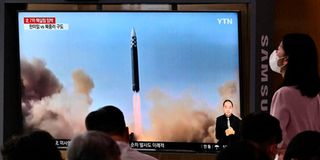China, Russia accuse US at UN of stoking North Korea tensions

People sit near a screen showing a news broadcast with file footage of a North Korean missile test, at a railway station in Seoul on June 5, 2022. Washington believes North Korea, which has carried out a blitz of sanctions-busting weapons tests this year, is poised to test a new nuclear weapon.
China and Russia took aim at the United States during a landmark UN General Assembly session on Wednesday, accusing Washington of stoking tensions on the Korean Peninsula.
The session was held for Beijing and Moscow to explain their decisions last month to veto a US draft resolution in the Security Council that would have imposed new sanctions on North Korea.
China's ambassador to the UN, Zhang Jun, hit out at Washington's approach to Pyongyang, saying tension on the peninsula has "developed to what it is today, primarily due to the flip flop of US policies," before making a plea for easing sanctions against North Korea.
Moscow's deputy ambassador to the UN, Anna Evstigneeva, also called for the sanctions to be lifted.
North Korea needs more humanitarian aid and the West should stop blaming Pyongyang for tensions, she said.
Speaking for the United States, deputy ambassador Jeffrey DeLaurentis dismissed the accusations, saying the current sanctions and proposals to add more are in direct response to North Korea's actions.
"We seek a dialogue with Pyongyang without preconditions. We have passed this message on through private channels as well, including high level personal messages from senior US officials to senior DPRK officials," he said, using an acronym for North Korea.
Washington believes North Korea, which has carried out a blitz of sanctions-busting weapons tests this year, is poised to test a new nuclear weapon.
Pyongyang's ambassador, Kim Song, justified his country's military tests by stressing that articles of the UN Charter "clearly stipulate that every state has inherent rights of individual or collective self defense."
The European Union, along with South Korea and Japan, see the tests as showing a flagrant disregard for UN resolutions and the international community.
The sanctions are an "essential tool" for the Security Council during crises, argued the EU representative, Swedish ambassador Olof Skoog.
The Wednesday session was the first at which permanent members of the Security Council had to explain their use of the veto, a step required under a resolution adopted by the 193-member General Assembly on April 26.
Since the first veto ever used -- by the Soviet Union in 1946 -- Russia has used it 144 times, far ahead of the United States at 86 times.
The United Kingdom has used its veto 30 times, while China has done so 19 times and France 18.





